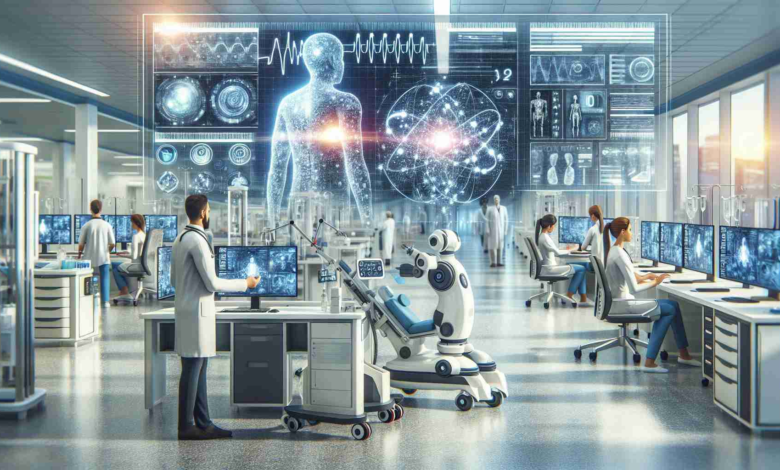The Emergence of Generative AI Technologies

The healthcare industry is on the cusp of a significant digital transformation, driven by generative artificial intelligence (AI). This innovative technology, capable of crafting and scrutinizing a broad spectrum of data including images, text, audio, and videos, is swiftly weaving its way into healthcare, thanks to concerted efforts by both established tech giants and emergent startups.
Google Cloud has teamed up with Highmark Health to develop generative AI tools aimed at customizing the patient intake process. Meanwhile, Amazon’s AWS is funneling its resources into using generative AI for mining medical databases in search of social health indicators. Furthermore, Microsoft Azure is collaborating with Providence, a not-for-profit healthcare network, on an AI system meant to prioritize patient messages for healthcare providers.
Cutting-edge startups are not far behind, with Ambience Healthcare, Nabla, and Abridge at the forefront of designing intuitive generative AI applications for clinical settings. With tens of millions in venture capital pouring into these initiatives, the interest in leveraging generative AI within healthcare is undeniable.
However, perceptions of generative AI’s readiness to take center stage in healthcare are diverse. A Deloitte survey shows an even split among U.S. consumers; approximately 53% believe generative AI could enhance healthcare by increasing accessibility and reducing appointment durations, but skepticism persists regarding its potential to decrease medical costs.
Experts, such as Andrew Borkowski from the VA Sunshine Healthcare Network, underline the considerable limitations of current generative AI technologies. The concern is real, with studies demonstrating that AI systems can frequently misdiagnose conditions and encounter struggle with routine medical administrative tasks.
The limitations of generative AI extend to the replication of historical biases in medical advice, a problem uncovered in research from Stanford Medicine, indicating the perpetuation of false biological differences between ethnic groups. This is concerning, given that those who may benefit most from AI-driven healthcare advancements are also those at greatest risk of being marginalized by biased algorithms.
Despite these hurdles, there’s optimism circling improvements in generative AI aimed at reducing bias and enhancing accuracy. Advances in medical imaging AI systems point towards a future where generative AI could significantly aid in early detection and diagnosis, potentially saving lives by identifying conditions that evade current manual detection methods.
As generative AI evolves, it is clear that it holds the promise of revolutionizing healthcare, but it must be ushered in with caution, safeguarding against premature reliance and ensuring it complements, rather than replaces, human expertise.
Current Market Trends:
The global market for AI in healthcare is on a significant upward trajectory, with analytics suggesting impressive growth fueled by advancements in machine learning, an increase in healthcare data, and the demand for precision medicine. Remote patient monitoring, diagnostic processes, drug discovery, and personalized treatment are areas where AI is increasingly applied. Many healthcare systems are also adopting AI to streamline administrative operations, which represents another flourishing market trend.
Forecasts:
The AI healthcare market is estimated to continue expanding rapidly over the next decade. Growth is driven partly by the COVID-19 pandemic, which highlighted the need for technological solutions in diagnosing and managing diseases. Furthermore, AI is expected to play an essential role in aging societies, where there is a high demand for healthcare services and a need for effective management of chronic diseases. It is also anticipated that regulations pertaining to AI in healthcare will evolve to keep up with these technological advances.
Key Challenges and Controversies:
One of the foremost challenges is the integration of AI within existing healthcare systems, which can be slow due to regulatory hurdles, privacy concerns, and a potential resistance to change among healthcare providers. The controversy surrounding bias in AI algorithms remains a prominent issue, as does the ethical dimension of AI decision-making in healthcare. The reliability of AI systems in making accurate diagnoses, especially rare ones, is heavily scrutinized, as is the security of patient data when managed by AI systems.
Pressing Questions Relevant to Generative AI in Healthcare:
1. How can generative AI improve patient outcomes?
2. What measures are being taken to minimize bias in AI algorithms?
3. How is patient privacy being protected in the integration of AI technologies?
4. What are the potential consequences of AI system errors in healthcare?
5. How will AI impact the roles of healthcare professionals?
Advantages:
– Generative AI can potentially revolutionize diagnostics, providing quicker and more accurate diagnoses.
– It can reduce the time healthcare professionals spend on routine tasks, allowing them to dedicate more time to patient care.
– AI could drastically decrease the cost of healthcare in the long term by improving efficiency and reducing the need for certain types of medical interventions.
– The capability to analyze vast datasets can lead to significant advancements in personalized medicine and treatment plans tailored to the individual patient.
Disadvantages:
– There is a significant risk of integrating biases within AI algorithms, leading to unequal healthcare services.
– Dependence on AI could make healthcare systems vulnerable to data breaches and cyber-attacks.
– The cost of implementing AI technologies may be initially high, creating a financial barrier for some institutions.
– There is the potential for AI to misdiagnose conditions, which could have serious implications for patient health.
For further official guidelines and updates regarding AI in healthcare, you can visit the websites of relevant regulatory bodies and organizations such as the U.S. Food and Drug Administration (FDA), World Health Organization (WHO), and U.S. Department of Health and Human Services (HHS). Their main domains provide resources and reports on the current state and regulatory progress regarding AI in healthcare.



